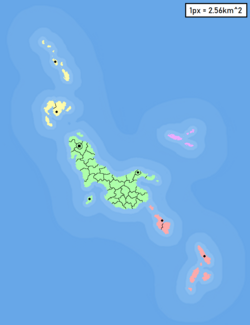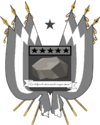Flatstone
De Republikken Flatstein The Republic of Flatstone | |
|---|---|
| Motto: "En bølgende stein samler ingen mose." | |
| Anthem: The Rock Cycle Song | |
 | |
| Capital and largest city | Shale |
| Official languages | Norwegian English |
| Ethnic groups | Stoenian |
| Demonym(s) | Stoenian Steinmann (Norwegian) |
| Government | Full Presidential Republic |
| President Leif Erockson | |
| Placeholder | |
| Legislature | The Congress of Flatstone |
| formed | |
• established by rogue pillagers | September 21st 1891 |
| Area | |
• Total | 22,662 km2 (8,750 sq mi) |
| Population | |
• 2019 estimate | 5,600,000 |
• 2010 census | 5,443,412.4 |
• Density | 247.1/km2 (640.0/sq mi) |
| GDP (PPP) | 2018 estimate |
• Total | $0.45 Trillion |
• Per capita | $51,461.95 |
| GDP (nominal) | 2018 estimate |
• Total | $455.3 Billion |
• Per capita | $51,461.95 |
| Gini (2018) | 24.9 low |
| HDI (2018) | very high |
| Currency | Silver Stone (SVST) |
| Time zone | UTC-2 (PST) |
• Summer (DST) | UTC-2 (not observed) |
| Driving side | left |
| Calling code | +224 |
| Internet TLD | .rock |
Government
The Commonwealth of Flatstone is a Presidential Republic with a Parliamentary System. The head of state is referred to as the President, who is elected into his/her position via octennial elections. As head of state, the president is able to issue proclamations and is also the one who signs bills into law after being passed by the Congress of Flatstone. There are five political parties that reside within Flatstone, and only four of which have ever won an election. There are a total of 475 Members of Congress. 100 serve in the Flatstone Assembly and 435 serve in the Flatstone House of Representatives. How long do members of Congress' terms last? Members of the House of Representatives serve four-year terms and are considered for reelection every even year.
Presidential elections occur every 8 years, and either gender can be elected for president. The current ruling political party is the Republican Party of Flatstone, which is rivaled by the Democratic party of Flatstone. The third major political party is the Nationalist Party of Flatstone, which is a common enemy of both the republican and the democratic party. There are two minor parties, both of which have barely any support, they are the following: The Green Party, The Flatstone Libertarian Party.
The Granite Building is used as a capital building for housing government officials in Flatstone. The building is located in Shale, the capital of Flatstone.
Demographics
The Kingdom of Flatstone was formed in 1891, after nordic pillagers that were living on the archipelago established a society. Flatstone remained a monarchy until 1933, when the Shale Massacre occurred. Nationalism had grown support throughout the early 20's and 30's, leading up to a revolution occurred during October of 1933, when the monarchy was overthrown by the Nationalist Party of Flatstone, and was abolished entirely. Nationalist rule over Flatstone didn't last long, because only 6 years later, the Democratic Party of Flatstone assassinated the leader of the Nationalist Party and won the elections of 1940. Although the Nationalist Party lost the 1940 elections and the majority of its support, it still remains as a "Major" party in Flatstone.
In 1898 the raider groups that helped to establish a society were turned into a small military force, this military force would come to be known as the Steinhær. This force would go on to expand Flatstones territory further north and south of the Archipelago, annexing islands that are now controlled by Senshen and Almeyynia. These territories were lost after the monarchy was abolished, and they are now considered the fourth and fifth provinces, Flatstone has claims on both of these territories.
Ethnic Groups
Education
Health
Language
Norwegian has always been the first and major language of Flatstone, it being recognized as the official language of Flatstone in 1901, because of the large population that had spoken it. It was also widely taught throughout schools, and was probably the most accessible language throughout the country at the time.

